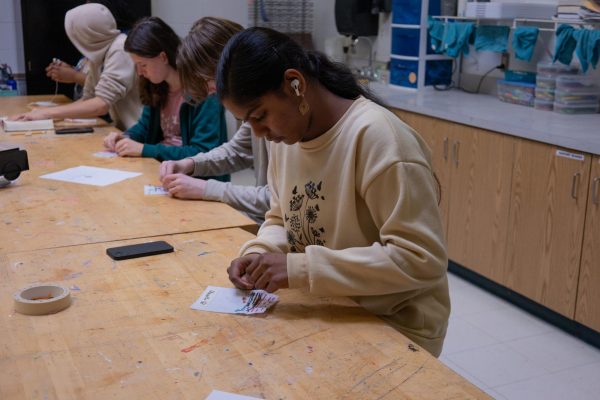Speaking Up
Autism Speaks funds anti-autistic rhetoric
A collection of blue puzzle pieces form and interlocking grid. The blue puzzle piece is the logo for Autism Speaks.
After placing my order at White Castle, the voice on the drive-thru speaker asks, “Do you want to round up for Autism Speaks?” As a fan of charity and perfect totals, I usually say yes without a second thought. I mean, it’s for a good cause, right?
I am no stranger to Autism Speaks. Growing up with an autistic sibling I was always surrounded by their events and their rhetoric. As a new mom of an autistic child, their events seemed like the best way for my mom to connect with the autistic community. I remember going downtown to Forest Park with my family for an Autism Speaks fundraiser walk. I remember my mom wearing puzzle piece jewelry and clothes to support my brother. I remember feeling like we were doing something good. That we were helping.
A few years ago, social media began to buzz about Autism Speaks. A simple Google
search and you’re flooded with articles from news outlets, autism advocacy groups, and autistic bloggers all chronicling their hatred of the organization. But why? To be perfectly candid, Autism Speaks doesn’t help autistic people. In fact, a lot of their actions and language actively hurt the autistic community.
One of their most infamous fundraising tactics was their 2009 “I Am Autism” campaign. It
featured a video of children playing while a grim voice-over stated that autism “works faster than pediatric AIDS, cancer, and diabetes combined” and was coming to “rob you of your children and your dreams.” In summer 2019, Autism Speaks partnered with Sesame Street to promote a resource that advises parents to follow the five stages of grief for their newly diagnosed (and still very much alive) child. Likening autism to a serious illness such as leukemia undermines those who have lost loved ones and creates a lasting stigma against autistic people. Campaigns such as these were designed to scare viewers, and in turn, increase donations for Autism Speaks.
What the organization planned to do with the funds they raised was far scarier than any caricature they could paint of autism. While many believe the money they donate goes to supporting autistic people and their families, this could not be further from the truth. In their most recently available financial report, 68 percent of their annual budget went to fundraising and lobbying efforts. “Lobbying for what?” you may ask. Autism Speaks consistently stands against self-advocacy for autistic people; this is most clearly seen in their efforts to kill an amendment to the Autism Cares Act in 2014. An amendment that would have allowed for autistic people to be included in creating the policies and conducting the research that affects their lives.
Another 27 percent of their budget goes towards research. Autism Speaks has faced intense backlash for focusing on solutions or cures for autism, and ended up removing the word cure from their research goals to soothe tensions. Removing a word can’t erase a history of anti-autistic rhetoric and research.
Autism Speaks makes a special effort to support parents of autism. Even I can’t argue that this isn’t admirable. I have watched my parents struggle to raise my brother. Struggle to prepare him for adult life. They need people to support them too, but at the end of the day, I expect more than just parental support from the leading autism advocacy organization. Committing to listening to autistic people, involving autistic people, and actively supporting autistic people is the bare minimum, and with few autistic people in positions of leadership and less than one percent of their annual budget going towards family services, Autism Speaks isn’t doing nearly enough to support the autistic community.

If you’re wanting to support the autistic community without supporting Autism Speaks,
I recommend focusing your resources on the Autistic Self Advocacy Network. ASAN works to give autistic people the tools to control their lives, includes autistic people in leadership roles throughout the organization, and seeks to organize the autistic community to ensure that future progress echoes the desires of autistic peoples.
Vote with your dollar. Support organizations that support your values, and next time White Castle asks if you would like to support Autism Speaks, say no.
Your donation will support the student journalists of Francis Howell Central High School. Your contribution will allow us to purchase equipment and cover our annual website hosting costs. FHCToday.com and our subsequent publications are dedicated to the students by the students. We hope you consider donating to allow us to continue our mission of a connected and well-informed student body.








